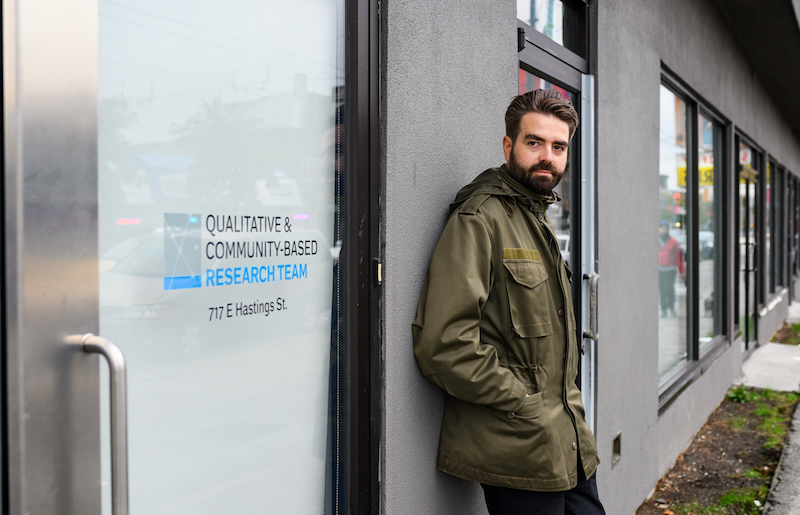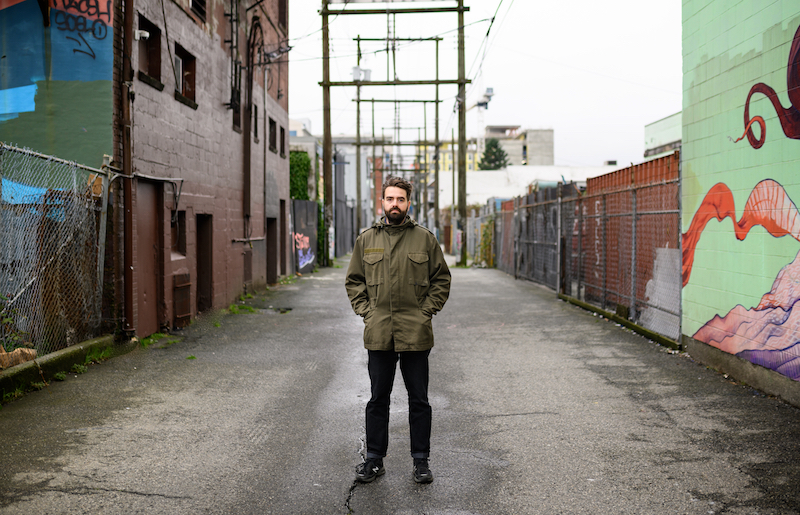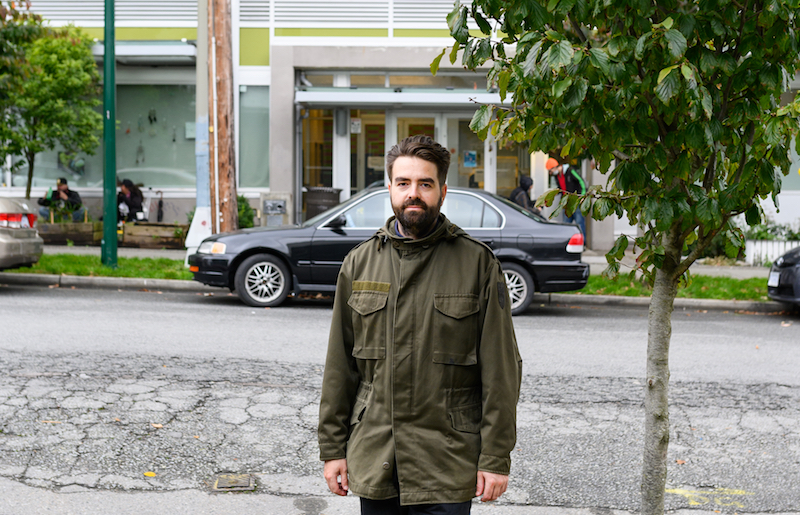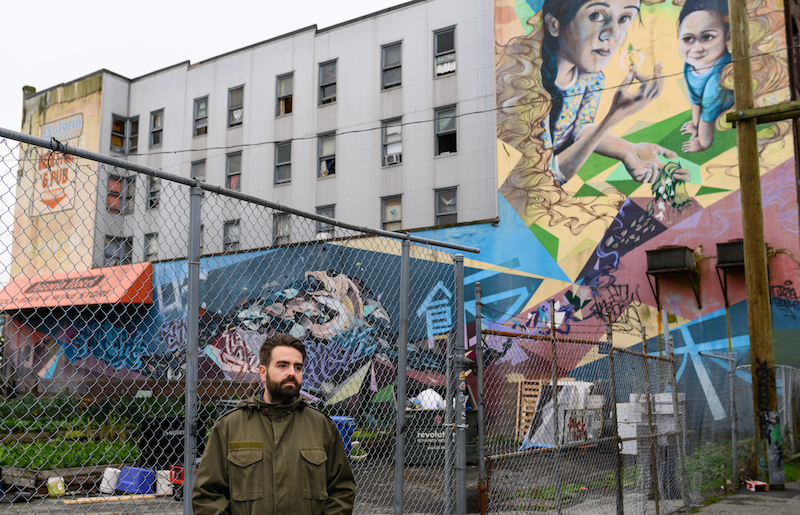 Dr. Geoff Bardwell received a National Housing Strategy Housing Research Scholarship to examine housing-based overdose response interventions in Vancouver.
Dr. Geoff Bardwell received a National Housing Strategy Housing Research Scholarship to examine housing-based overdose response interventions in Vancouver.
 Dr Bardwell says most people assume overdoes take place on the street, but coroners’ data shows that 90% of overdoses occur in the places where people live.
Dr Bardwell says most people assume overdoes take place on the street, but coroners’ data shows that 90% of overdoses occur in the places where people live.
 Dr. Bardwell spoke with residents at The Alexander Street Community, a housing development for people dealing with substance dependencies and a range of other challenges.
Dr. Bardwell spoke with residents at The Alexander Street Community, a housing development for people dealing with substance dependencies and a range of other challenges.
 Dr. Bardwell would like to see his research lead to concrete changes such as increased program funding or services for those in crisis.
Dr. Bardwell would like to see his research lead to concrete changes such as increased program funding or services for those in crisis.
November 27, 2020
Scholarship winner studies link between overdoses and housing
British Columbia is suffering from an opioid overdose epidemic. More than 4,000 people died of a drug overdose between 2017 and 2019. Most people assume overdoses take place on the street. Coroners’ data show that 90% occur in the places where people live.
How can prevention policies and programs better address this?
This question drives Geoff Bardwell’s work. Dr. Bardwell is a researcher with the BC Centre of Substance Use (BCCSU). In 2019, he was one of 8 recipients of the inaugural post-doctoral housing research scholarships offered through the National Housing Strategy, in partnership with the Canadian Institutes of Health Research’s Healthy Cities Research Initiative.
“Vancouver has leading-edge outreach programs, like supervised consumption services with wrap around supports and peer-led overdose prevention sites,” says Dr. Bardwell.
“But for many reasons, people don’t always use drugs there. Instead they use in their apartment, in supportive housing, shelters or hotels used for emergency housing. Knowing this, we need to focus on developing effective in-reach programs delivered in the places where people live.”
Through his research, Dr. Bardwell will explore the influence of physical, social and structural factors on overdose risk. He’ll look at existing housing-based interventions to see what’s working and how they could be improved or scaled up. He’ll do this by gathering qualitative and ethnographic data through interviews with people who use drugs, housing providers and grassroots organizations delivering programs.
“I’ll be looking at physical spaces within housing environments that are designated for drug consumption and how they impact the way people use drugs,” says Dr. Bardwell. “For example, are they too closed in, or too open? How can we balance privacy with the need to monitor for safety? Is there staff on-site to carry out the program? Are they supportive of it? What’s the impact of stigma and policies that discriminate against people who use drugs?”
B.C. is suffering from an opioid overdose epidemic. With most overdose deaths happening in the home, Dr. Geoff Bardwell and the @BCCSU are researching and finding solutions to overdose risk in the places where people live.
The COVID-19 pandemic has slowed Dr. Bardwell’s ability to carry out his research. That said, it has made his work more important than ever.
B.C. has seen a surge in overdose rates during the pandemic, with a record number of deaths in July alone. That month, on average, more than 5 people died every day, most of them alone in their homes.
“The pandemic and physical distancing have made us all feel more isolated and overwhelmed,” says Dr. Bardwell. “For those who use drugs, the situation is worse because the services they rely on have been reduced. They are also more likely to be using alone, which is more dangerous.”
Dr. Bardwell is adapting his research questions to look at emergency measures set up during the pandemic. This includes a program to ensure a housing-based supply of safe prescription drugs provided to people who use substances. It responds to fears that with greater restrictions at the Canada-US border, the illegal drug supply has become increasingly toxic.
Dr. Bardwell’s academic career was shaped by his early job experiences. He worked at a needle and syringe program in his hometown, London, Ontario. Later he was a housing stability worker with the local Housing First program. These jobs gave him insight into the daily lives of people using drugs, and how some policies and programs negatively affected them. The experience also inspired a passion for social justice that drives his research.
The Housing Research Scholarship gives him a chance to develop his research career and effect real change.
“So far, I’ve been fortunate,” reflects Dr. Bardwell. “I’ve been able to see my research lead to concrete changes. I’m hoping the same will continue to happen. It could mean that a program gets more funding or a service gets scaled up. Or it could help change public attitudes and get more support from policy makers who have the power to effect larger systemic change.”
In 2019, Geoff Bardwell received a National Housing Strategy Housing Research Scholarship to examine housing-based overdose response interventions in Vancouver. He was one of 8 researchers to each receive the $90,000 scholarship. The Housing Research Scholarship program is offered in partnership with the Canadian Institutes of Health Research (CIHR), the Social Sciences and Humanities Council of Canada (SSHRC), and the Natural Sciences and Engineering Research Council of Canada (NSERC).

